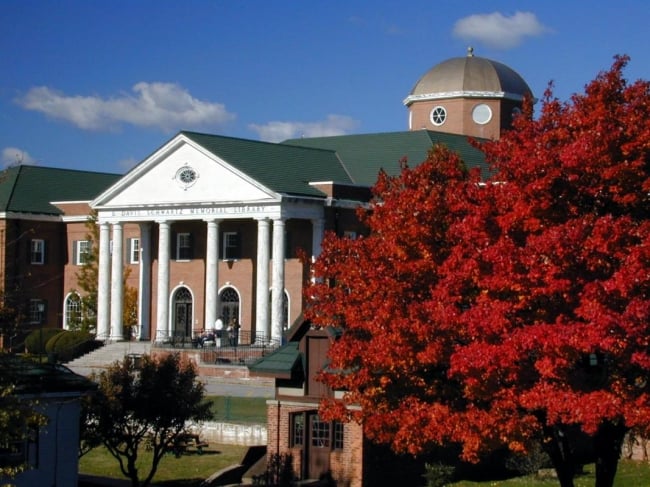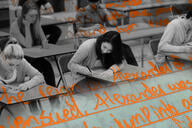You have /5 articles left.
Sign up for a free account or log in.

The Long Island University Post campus
Courtesy of Long Island University
Long Island University has frozen new enrollments in undergraduate programs in fields including chemistry, history, philosophy, photography, physics, sociology and public relations in what some faculty view as an assault on the liberal arts core of the institution.
The enrollment freezes follow on eliminations or freezes in recent years of other programs at the New York institution's Post campus, including programs in art history, earth system science, French, Italian, music performance, Spanish, geography and geology. A list of frozen programs provided by the chair of LIU Post's Faculty Council also includes a number of education-related undergraduate programs as well as master's programs predominantly in the liberal arts and education fields.
Ed Weis, LIU's vice president for academic affairs, said in a statement that "most" of the education programs identified as frozen had been renamed or restructured, but he confirmed that some humanities programs had been frozen in line with what he described as a national trend of declining student interest in these areas.
"Over the last several years, LIU has been expanding program offerings in high-demand areas while assessing programs with low enrollment," Weis said. "All academic programs are regularly reviewed to ensure that they are competitive, relevant and of the highest quality for our students. As a result of this best practice, certain programs with very low enrollment of entering students for a number of years were frozen. While new students will not be admitted to these programs, the university will continue to offer the necessary courses for current students to be able to graduate on time within these majors.
"The university has a fiduciary responsibility to provide a rigorous and engaging educational experience for our students," Weis added. "The classroom experience is at its best when faculty engage their students in challenging and interesting peer-to-peer discussions. Classes with a very limited number of students do not allow for this desired level of engagement. In fact, academic programs with only a handful of majors can result in these students taking their upper-level courses as independent studies."
LIU Post, like many private institutions, has seen enrollment declines. Total full-time-equivalent undergraduate and graduate enrollment at the Post campus has declined from 6,029 in 2015 to 5,458 in 2019, a drop of about 9.5 percent, according to data LIU provides to its bondholders. However, the number of enrolled freshmen spiked last fall to 771 students, up from 564 the fall before, an approximately 37 percent increase.
Universitywide, across all campuses, the number of total faculty has declined by 21 percent since 2015, from 1,979 to 1,558.
Audited financial statements show a 14 percent drop in universitywide operating revenues from 2014 to 2019, from about $396.5 million to $341.4 million. But net assets have risen substantially in that time, from about $291 million to roughly $506.9 million.
Faculty at Post say they are alarmed by the program freezes in core liberal arts areas.
“It’s dismaying,” said Jeremy Buchman, the chair of the Faculty Council at LIU Post and an associate professor of political science. “There are a lot of very apprehensive faculty in the affected programs, especially in the arts and sciences. There’s concern about where the arts and sciences stand. There’s concern about our current students and their ability to finish the program that they signed on for. The university has said that current students in the frozen programs will be able to finish. But logistically speaking, it makes life a lot harder for students if you don’t have a new crop of majors, even if it’s a relatively small group that’s going to have an impact on the range of course offerings that current students will have to choose from.”
"Many of the faculty are heartbroken by the choice not to support these programs," said Wendy Ryden, an associate professor of English and the acting president of the faculty union at the Post campus. "We feel that it negatively impacts faculty in their workload and it negatively impacts student choice in terms of what they can be allowed to study when they come here."
The program freezes were first reported by Ashley Bowden, the co-editor of LIU Post campus’s student newspaper, The Pioneer. Bowden, a senior, said other students were dismayed to learn the news.
“They’re just disappointed in seeing these kinds of things happen,” she said. “It’s disheartening for me to have to report something like this where I go to school. As a student in the liberal arts, it’s not very encouraging at all.”
Weis said that the frozen programs "may become viable with curriculum changes. The university has consistently encouraged its academic departments over the years to update their programs to align with student demand."
He noted that the "national trend of declining student demand for certain majors in the humanities is not unique to LIU" and that the university "is deeply committed to a liberal arts education through our core curriculum."
"The recent successful launch of new, in-demand programs is expected to more than offset the loss of small new enrollments in programs that have recently been frozen," Weis said. "These new programs are also driving demand for additional classes in the liberal arts and sciences."
At the same time as enrollment by new majors in core liberal arts disciplines is being frozen, the university is planning to enroll its first students in a new veterinary college this fall. Some faculty have expressed opposition to the opening of the veterinary college at a tuition-driven liberal arts institution. Most veterinary schools are located at major research universities.
Michael A. Soupios, a professor of political science who has taught at LIU for more than 30 years, said that in his opinion, LIU has lost sight of what is meant by “university.”
“I think we’ve lost track of who we are institutionally,” Soupios said. “I am not sure that we are adequately in touch with the very definition, the very meaning of the word 'university.' We seem to be hurtling headlong in the direction of becoming essentially a vocational school. I understand that’s what people are looking for in terms of jobs, but if you want to flatter yourself by calling yourself a university, then you have to act like it, and you have to maintain a curriculum that reflects that.”
Soupios described the use of the word “freeze” as “euphemistic rubbish … Frozen is tantamount to death. You’re not going to be thawed.”
Molly Tambor, an associate professor in history, one of the programs frozen, said she is willing to hold onto the word "freeze" because she is hopeful administrators will work with faculty to unfreeze the affected programs. The history department has already met with administrators and has another meeting planned. She said administrators seem interested in faculty ideas for renewing the program.
"If we’re measuring by student interest and engagement in our courses and in students who declare a major and a minor at any point in their career, then it seems to us that the history program is actually very healthy," she said. "We also feel that a history program at a liberal arts institution is a necessary and vital one and deserves to have investment and resources."




